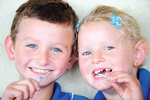Students get cheeky for research
 Health Health
Students from schools right across Australia will play a key role in the world's biggest study into the genetic causes of cerebral palsy, and they'll need to get "cheeky" to do it. The study - being conducted by researchers from the University of Adelaide - is enlisting the help of primary and secondary schools in all Australian States. The researchers are currently looking for 10,000 Australians to take part in the study, including those with and without cerebral palsy, to help unravel the mystery of how genetic mutations are linked to cerebral palsy. Students aged 5-18 years will be able to get involved in the study by providing genetic samples in the form of cheek swabs. Parental permission will be required before students can provide a cheek swab. Once taken, these swabs will help researchers to understand what genetic differences exist between those who do and don't have cerebral palsy. Researchers also need the students' mothers to provide a cheek swab, which will be important in comparing any genetic differences that occur from mother to child. "In order to understand how cerebral palsy is caused at a genetic level, we need a large sample size in the community," said the research leader, Professor Alastair MacLennan, Head of Obstetrics & Gynaecology at the University of Adelaide and head of the South Australian Cerebral Palsy Research Group. "What we're looking for is young people aged between 5-18, which is why school students are perfect for this study, and their mothers. "This is the one time when being 'cheeky' at school will actually be doing the community a favour," Professor MacLennan said. Researchers have begun contacting schools around the country asking for their help with the study. "By targeting schools, we're hoping not only to gain a large number of genetic samples but we're also helping to educate young people and the community about what cerebral palsy is and what we can do about it," Professor MacLennan said. "A number of schools have already been very responsive to our call for help." The researchers will: - Distribute invitation letters from the school principal to parents;
- Host recruitment booths at schools and school fairs;
- Insert recruitment flyers in school newsletters;
- Display posters on school noticeboards;
- Give brief presentations at school assemblies or other school events.
Cerebral palsy is one of the world's most serious complications during pregnancy and birth, affecting one in every 500 children born in Australia. It was once commonly thought that cerebral palsy was caused by low oxygen levels during birth. However, studies conducted by the South Australian Cerebral Palsy Research Group show that the condition is often associated with genetic mutations that either increase blood clotting within the unborn child's brain or make the fetal brain more vulnerable to damaging infection. "Because the problem is so big and affects so many people, we have an opportunity to make an impact by helping to unlock some of the mysteries about this condition. With enough public support, we may be able to do just that," said Michael O'Callaghan, PhD student and study coordinator. To find out more about the study, visit: www.adelaide.edu.au/cerebralpalsy Story by David Ellis
|





